It is a commonly debated topic in the community where members discuss about potential rationale on why certain series in Japanese are never carried over to English. As a reminder, I do not work for Bushiroad nor have direct insights into how their business operates. Everything spoken here is based off educated guesses and is no basis for any financial prospects.
When it comes to upcoming series, Japan is often much more flashy when it comes to releasing series compared to that of English. Now there are a plethora of reasons why English announcements may feel delayed and more, but that isn’t exactly the purpose of this article. Many players observe and have traditionally followed the general widely spread belief of: Japanese first, English second. For the first few years of the English format’s lifespan, that was pretty much accurate for the most part. English releases were rather odd as well, bringing back in Fairy Tail with modifications (Fairy Tail Ver. E) many years after it had been released in Japanese for example.
Sometime in the mid 2010s, English pivoted and became more of a dedicated copycat of the Japanese format. Rather than cherry-picking sets that seemed to traditionally appeal to certain anime fans, the English game began importing more of the most recently released series that had been released in the Japanese format.
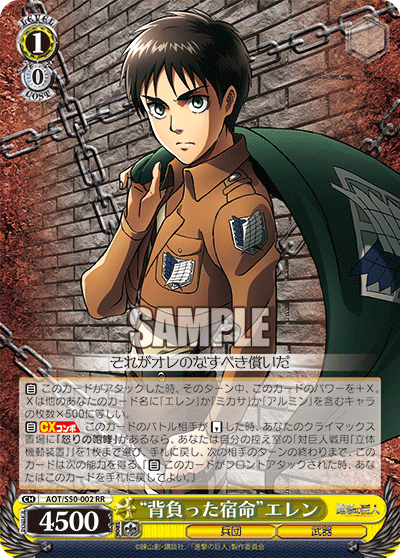
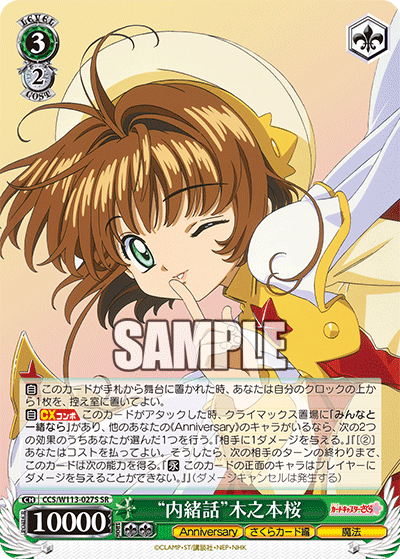
Things, however, had changed closer to the latter half of the 2010s with the surprise arrival of two sets: Attack on Titan and Cardcaptor Sakura. Attack on Titan was announced as an early EN series. What that meant was that the series, for the first time in history, would come out in English first and then Japanese second. Cardcaptor Sakura was a strange exception that came out with its own exclusive version and cards that are completely different from its Japanese counterpart. There is a lot of drama concerning the history of Cardcaptor Sakura EN, but that is for another time.
The point is, for the most part, the general rule that the community has come up with sets releasing first in Japanese and English second has been relatively correct. It is a common pattern, but even then, even all the way back in English’s debut, not all series have directly transferred to English. Now there are a plethora of reasons that we can explore.
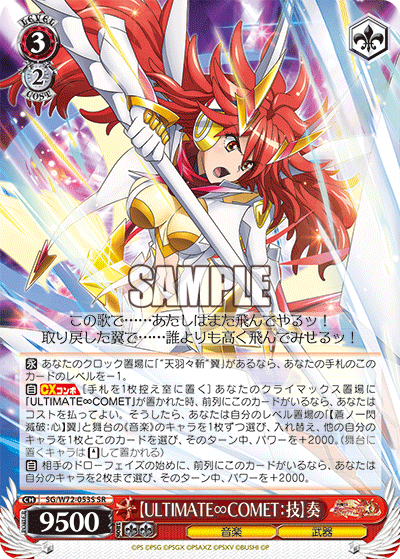
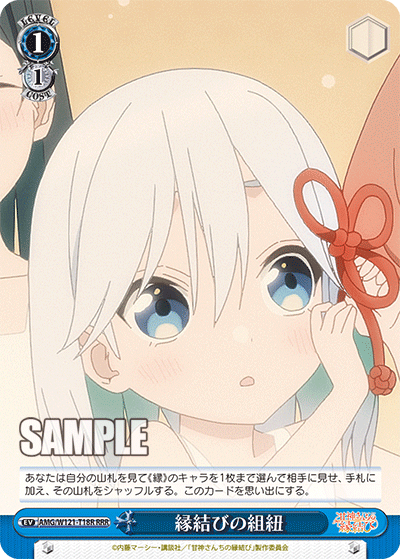

AMG/W121-T18R-RRR 縁結びの組紐 (center)
GU/W88-095C “ガレット・デ・ロワ” チノ (right)
First and foremost, I think the most logical reason is the popularity of a series as a whole in the West. Now, Bushiroad is a company. They must make sales. If an IP (independent product) is not profitable in the West, then they are less inclined to print that product. There are many series in Japanese that may only maintain a semblance of popularity over here in the West comparatively in Japan. I am not saying that there are no English fans, it is just the population that enjoys said series is relatively low. An unpopular series means low sales, so that equally means no transfer of series in language.
Now I want to make a point about perceived popularity versus actual popularity. Another concept to keep in mind is the general relativity and scaling of popularity. So I want to give a figurative guess on the general fanbase for some of the series in the game. Let’s take a look at a series such as Kaiju No. 8. Now it’s fairly obvious that large shounen shows typically make lots of money. Series like One Piece, Naruto, and Bleach, for example, will always bring in some large revenue. Now Kaiju No. 8. was a relatively popular show even among my community members. There was some talk of Kaiju No. 8. in nearby anime circles close to me or that I am a part of. However, the bitter reality is that Kaiju No. 8. isn’t nearly as big as you may suppose it to be.
Before we go on, I want to remind readers that the two games, despite sharing the same cards sometimes, are different formats entirely. Japan also has it’s own culture and differences when it comes to card games which I won’t really explore here. Bottom line, I’d believe Japan operates differently from the West when it comes to printing series and product numbers.
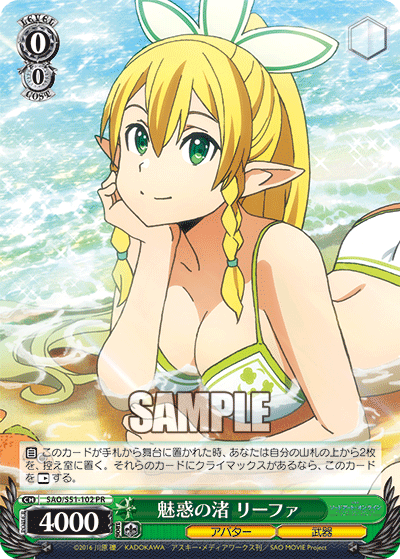
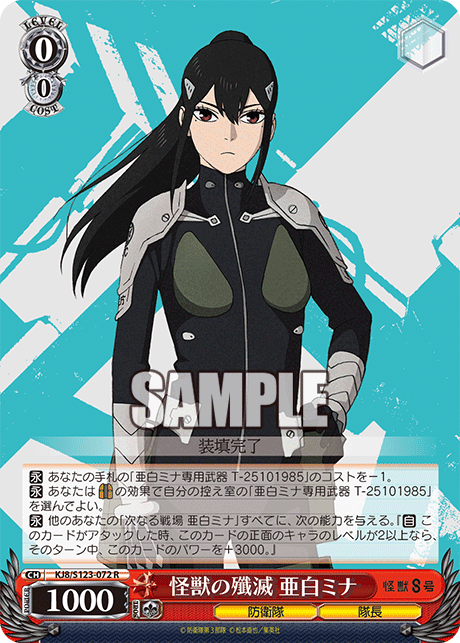
Well, saying the fanbase is large or small doesn’t really matter unless we put it to scale with something else. Take for instance that of Sword Art Online. Now, in truth, Sword Art Online’s fanbase probably pales in comparison to the aforementioned shounen series, but even then, Sword Art Online had a relatively cult success and became a title that is fairly well known on a global scale. Meanwhile, while some may acknowledge Kaiju No. 8., it doesn’t come close to the general populace that would know of Sword Art Online in comparison.
Let’s take a step back and look at this from the perspective of the Bushiroad team. Sure, there are definitely dedicated fans of both Sword Art Online and Kaiju No. 8. But remember, even with fans, not all of them will necessarily buy product. A good portion of fans will be excluded in metric counts. Now let’s take a look at the comparative number of fans theoretically that would purchase product. Sword Art Online’s fanbase that would purchase product is still significantly higher than that of Kaiju No. 8.’s. Even if more dedicated fans were to purchase into the product, it wouldn’t come close in comparison to the number of fans that would purchase Sword Art Online.
Would the company even break even if they were to sell Kaiju No. 8. products over here in the West? I cannot say for sure. But some argue that there are dedicated mega whales who will drop thousands of dollars into the market just for these cards. But that is not a sustainable model. Yes, there are people who will put money into the game, but will this give enough profit to push the company into potentially releasing this product?
This may sound harsh, but the reality of most anime series is that they just don’t have as many fans or are just not as profitable as you’d imagine to warrant a Western release. There are many small series with loud crowds that follow, but I’d believe that the data and expected revenue for these series would not hold up to move these series into the West.



HBR/W117-063SP-SP シークレットサービス・サイレンス 東城 つかさ (center)
MK/SE29-41SP-SP 審美の時間 アルセーヌ (right)
The next reason why some series don’t move over is just a variety of individual factors and simple recognition. I know that Gakuen Idolm@ster is very hot on some people’s radars right now, and folks do wish that it would move into the West. However, the chances are quite unlikely. Idolm@ster is a series that is owned and published by Bandai. Bandai has its own card games that are transitioning or already in the West. And since Idolm@ster is under their umbrella, they likely don’t want any competition overseas. This is just a possible reason. In general, as well, Idolm@ster has never really been recognized much in the West. There are followers, but the IP has remained pretty much Japanese all the way (in Weiss, there is one single series in English that has been moved over – Cinderella Girls and only the first set). To put it bluntly, Idolm@ster isn’t very (relatively) popular in the West for most folks and players.
There are some IPs that have some English ports such as that of Heaven Burns Red, but even then, the expected fanbase of these series are just generally quite low. Gacha game series are notorious for this. Their fanbases are quite loud, but in terms of spending, it’s a different ordeal entirely. I’m not saying that a gacha-based IP cannot find success in Weiss. You can look at Blue Archive as a good example of an IP that has been moved over to the West.
Lastly, there are just some IPs that are rather obscure, even by most anime watchers’ standards. Ironically, I’m using the example of Milky Holmes here, one of the flagship IPs that is directly owned by Bushiroad. Despite this, most people, I’d expect, barely know anything about Milky Holmes (I wish I could unsee the series myself personally). These series would just have never had a chance to begin with.


The last category of reasons why I’d think some series don’t get ported over is simply licensing issues. I’m sure series like Marvel and Disney are extremely popular in the West, originating from the West. However, and I do know that Marvel is coming (just delayed), it can be some amount of legal trouble to bring these series over to the West. I am not a lawyer. I know nothing about property laws, but given the fact that even Marvel’s release took several years to port to English, this suggests that there are some complications that would prevent a simultaneous release.
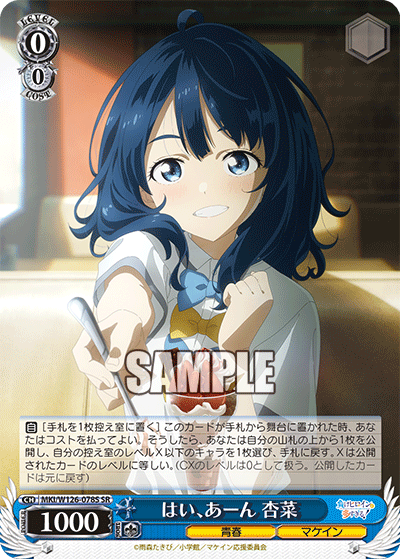
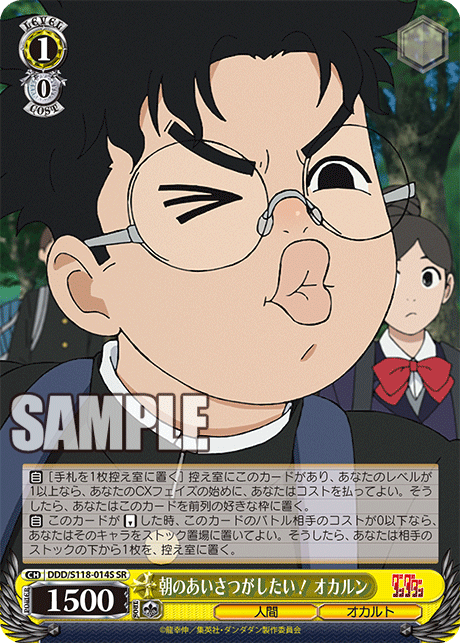

DDD/S118-014S-SR 朝のあいさつがしたい! オカルン (center)
ARI/S103-001RR 癒しの才能 香織 (right)
Granted, the reasons above aren’t set rules. These are just some brainstormed reasons. In reality, why and how series are moved from one language to another is only in the hands of those who are in charge of such decisions. We may never really know.
What I can say is that Bushiroad EN has done a recent stellar job in porting many of the series from the Japanese format into English for fans to enjoy. With each season, more and more Japanese series are moving in. Remember that the above reasons are just guidelines behind why a series may not be moved into English. Sometimes the pattern breaks, and if it does, cool. And I know players genuinely want their favourite series or a show they’d like to move over, but sometimes it just doesn’t happen for whatever reason. If that is the case, you could always buy the Japanese version or other language instead. There are multiple resources online to help translate cards. Worst case, you got an excuse to learn another language and make friends.
Nice try, Weiss Schwarz CN. You know I love Ryza; but you can’t bait me with the mobile game. I don’t even know any other atelier girls outside of her trilogy of games.